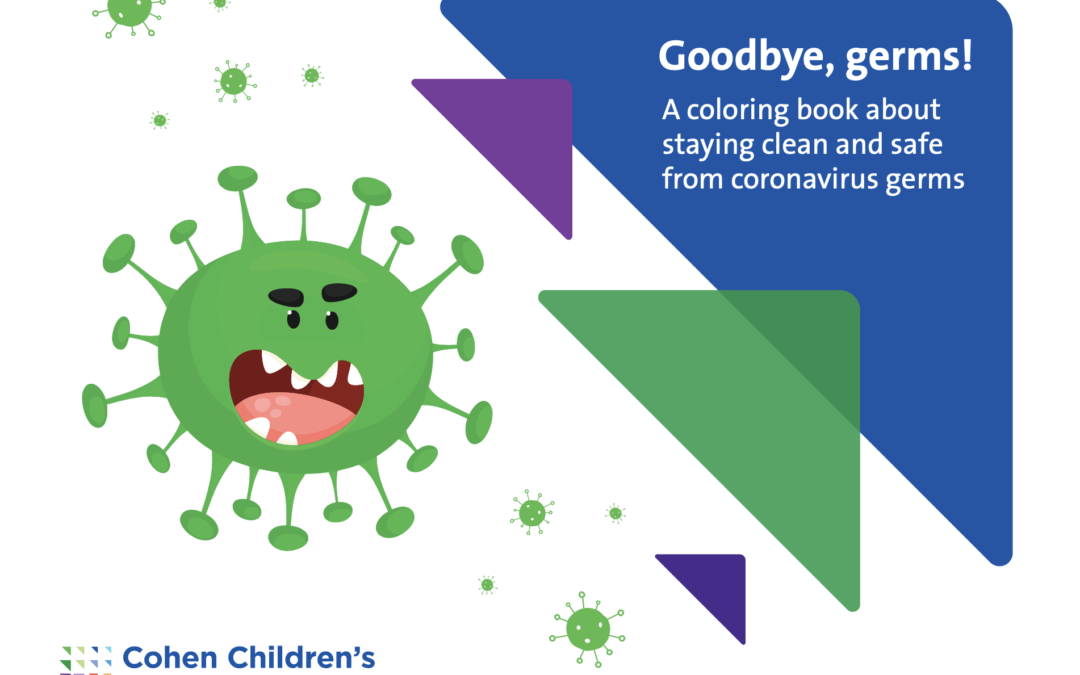
by North Shore Child & Family Guidance Center | Aug 6, 2020 | Blog
This school year will certainly be one like no other. For college students like myself, the idea of another remote semester can be incredibly frustrating, and it is hard not to feel anxious about the opportunities and experiences we have lost. College is built around time spent with peers, from living together in dorms to cheering on our school teams. With so much surrounding the COVID-19 pandemic still in flux, many college students do not know what this fall will bring.
I will be beginning my senior year at Fordham University in the Bronx this fall. I am incredibly grateful to be attending school in New York, where cases are considerably lower than the rest of the country. The process of moving in will not be as complicated, as I do not have to quarantine myself, nor do my roommates. Even so, I have struggled with a lot of anxiety throughout the summer already, wondering whether I am missing out on so many precious senior year traditions and whether we could potentially be sent back home.
Universities are taking many different approaches to the situation, and it largely depends on where the school is located. I was given the opportunity to opt for remote classes or in-person (with the professors being given the final say). I am able to live in my apartment on campus regardless of which method I choose.
With many classes being held online, whether by choice of the students or the professors, the financial benefits of still paying for on-campus housing or an apartment nearby are uncertain. Many students are grappling with paying large amounts of money to live with their peers and attempting to preserve what they can of the traditional college experience. Others are opting out, choosing to take online classes from home. Students from universities across the country have even urged for their schools to lower tuition due to online instruction.
There is no right answer in navigating the college experience amid the unprecedented pandemic we are facing. The decision to move on-campus, live in off-campus housing or stay home, as well as to take online or in-person classes, are deeply personal. Each student must consider their own comfort level, their physical and mental health, their financial situation and much more.
No matter what you have decided, the uncertainty looms above us all. It is hard not to feel like we are still losing so much as things continue to be cancelled or changed. Knowing that my senior year will, at least for the first half, be held largely online with a much quieter campus environment is upsetting, but I am comforted in knowing that we are all in this together. We are putting the health and safety of the community first, and that is what matters most.
I have found that this experience has taught me so much about myself. What I can handle, how much I can overcome. This generation that is experiencing such upheaval in times that are so precious will emerge with a strength that we will carry throughout our lives.
The uncertainty has brought many of us together, and this shared experience will be a deeper bond for the classes of 2020, 2021 and so on that we will not forget. We are also living in an age of technology that has allowed us to stay connected above all. While undoubtedly not the same, this technology is a vital tool for us to continue to remember those who are still by our side and who are struggling with the same worries and fears.
Anxiety is normal amid any kind of uncertainty, and we must learn to never feel guilty or ashamed for being worried. If you feel that you are struggling, do not hesitate to reach out to family or friends. There is no shame in seeking help — if you feel that you need assistance, mental health resources are here for you, including North Shore Child & Family Guidance Center, which is seeing clients remotely. Remember that asking for help is a sign of strength, not weakness.
Just months ago, many of us could never have imagined a situation like this. But here we are, and here we continue to go. We cannot make up for the time that would have been spent on campus. It is a reality we must come to terms with in order to move on. However, college is much more than the campus itself. It is the community forged from the shared experience of an institution and, if anything, going through this together, as a school community, can strengthen that. We know now that we can handle whatever is thrown our way.

by North Shore Child & Family Guidance Center | Jul 30, 2020 | Blog
Pregnancy and childbirth can be challenging experiences at any time. But amidst a global pandemic, many of the typical difficulties have been escalated. Many unknowns still linger regarding the potential impact COVID-19 can have during pregnancy as well as the virus’ potential impact on young children, making this an incredibly stressful time for new and expecting mothers in particular.
Unfortunately, one recent finding has demonstrated a worsening of anxiety and depression in new mothers during the COVID-19 pandemic. The study, from the University of Alberta, found that the rate of symptoms of depression in new mothers amid the pandemic was nearly three times the rate of new mothers’ symptoms pre-pandemic.
Concerns about financial security, job stability and overall health weigh far more heavily on new and expecting parents now than ever before. Considering the pandemic’s widespread financial difficulties, the prospect of paying for all the expenses that come with a new baby can be incredibly daunting.
The rate of symptoms of depression in
new mothers amid the pandemic was
nearly three times the rate
of new mothers’ pre-pandemic.
Added stress can also come from the precautionary measures to protect against the spread of COVID-19, especially social distancing. These measures can mean that extended family, grandparents particularly, may not be able to provide the support (such as childcare) for the new parents as they might normally. This can add to the parents’ stress and is also an immensely frustrating and disheartening reality for the grandparents and other family members who may not be able to see the new baby safely. Additionally, concern about potential exposure to the virus in public settings, especially during essential doctor visits for the newborn, aggravates anxiety symptoms.
Though the pandemic has heightened depression and anxiety rates for mothers, postpartum depression has been on the rise for many years. Postpartum depression is a mental health condition following childbirth in which a new mother experiences symptoms of depression that do not go away, as do the traditional “baby blues.” Some symptoms include feeling disconnected from the baby, a lack of motivation, restlessness and overwhelming feelings of sadness.
Statistics point to a notable disparity in the age of the mother. Teenagers face the most risk, with teenage mothers twice as likely to develop postpartum depression. Teenage mothers also suffer from higher suicidal ideation rates and are more likely to suffer from PTSD due to a higher likelihood of exposure to traumatic events.
Racial disparities play a role in both maternal mental health and teenage pregnancy. Researchers have noted that Black mothers suffer from postpartum depression and other perinatal mood disorders at a higher rate than white mothers. Additionally, though rates of teenage pregnancies have been decreasing across races, the pregnancy rate among Hispanic and non-Hispanic Black teenagers is more than twice that of non-Hispanic white teenagers. Given the connection between postpartum depression and teenage pregnancies, intersecting racial disparities can create an incredibly vulnerable new mothers’ population. COVID-19 has only added to this vulnerability, with the virus disproportionately affecting racial and ethnic minority groups.
North Shore Child & Family Guidance Center has two programs that address postpartum depression. One is called Good Beginnings for Babies, which seeks to help pregnant and parenting teens in a variety of areas to combat these vulnerabilities. Dr. Nellie Taylor-Walthrust, director of the program, explains, “The goal is to reduce the isolation of young parents in the early years of their child’s development and increase the community’s sense of responsibility for young families, by building a community of young parents who support one another.” This support is crucial in preventing adverse mental health conditions for teenage mothers.
Good Beginnings for Babies also provides screening for maternal depression and other perinatal mood disorders, as well as treatment or referrals for mental health care.
The other program is the Diane Goldberg Maternal Depression Program. It provides rapid response and diagnosis for mothers of all ages suffering from postpartum depression and other perinatal mood and anxiety disorders
Good Beginnings for Babies is located at Leeds Place – Serving Young People, our office in Westbury. For more information, contact us at info@northshorechildguidance.org or (516) 626-1971.
The Diane Goldberg Maternal Depression Program is located at our Marks Family Right from the Start 0-3+ Center in Manhasset. Call 516) 484-3174, ext. 415.

by North Shore Child & Family Guidance Center | Jul 23, 2020 | Blog
In the age of COVID-19, seeing a health care provider in the traditional office setting has become a potentially dangerous matter. Many health care providers, including doctors, mental health professionals and others, have closed their physical sites for their clients’ safety.
But a viable, necessary alternative has emerged in the form of telehealth, which refers to the use of communication technology such as cell phones or laptops to access health care services remotely.
North Shore Child & Family Guidance Center seamlessly pivoted to telehealth after our offices were closed in mid-March, and we’ve been seeing clients for individual, family and group therapy since that time. We’ve found some unexpected benefits of telehealth, including the ability to bring together family members who may have lived apart; getting insight into a client’s home life; and seeing clients who, because of illness, lack of transportation or other issues, cannot come into the office.
In addition, many individuals in need of mental health services may hesitate to get help, or even avoid it altogether. This can be for a variety of reasons, including (but not limited to) an inability to afford the services or the pervasive stigma surrounding mental illness.
Unfortunately, a delay in receiving these services can have devastating effects. Without help, the situation often escalates, and it can even grow into a matter of life and death. As Andrew Malekoff, executive director of the Guidance Center, explains, “Access delayed is access denied.”
Malekoff highlighted the value of telehealth in a recent Long Island Weekly article, where he emphasized recommendations for New York State to permanently remove barriers to telehealth services after the COVID-19 pandemic has subsided. He noted the experience of Vanessa McMullan, a clinical social worker at the Guidance Center, who discussed her recent experiences with clients and the benefits of telehealth in a variety of circumstances.
In one example, McMullan noted that many new mothers may delay mental health treatment out of fear that they may expose their vulnerable babies to illness or due to a lack of supervision for children at home. Given the pervasive nature of postpartum depression and other maternal mental health issues, this resistance can be highly detrimental to the mothers and their families. As McMullan explains, “These women are typically those who need services the most.”
With family therapy in particular, therapy sessions via video calls allow therapists to have a new sense of connection and intimacy with their clients. Therapists are able to see into the client’s home life and are able to understand more of their context than when in a removed office setting. The ease of online visits also enables the inclusion of family members who may be difficult to include in a traditional therapy setting, such as separated parents living in different areas.
Increasing access to telehealth services could also allow young adults attending college away from home to maintain a relationship with their local therapist, thus preserving the work that has been done.
While telehealth tools are not a perfect replacement for face-to-face sessions, they are undoubtedly a necessary service that enables accessibility of mental health care, and they should remain an option for the future. Accessibility of these services is more vital than ever, with rates of anxiety and depression rising rapidly amidst the uncertainty of the COVID-19 pandemic. Now is the time to utilize all tools at our disposal to ensure that clients who need care can receive it in a timely manner.
At North Shore Child & Family Guidance Center, accessibility to mental health services for all is a central mission of ours. For more information, we invite you to learn more about Project Access, an initiative designed to identify obstacles to accessing necessary care and finding solutions for change.
Sources:

by North Shore Child & Family Guidance Center | Jul 20, 2020 | COVID-19, In The Media
Two major New York State mental health advocacy organizations—the New York State Council for Community Behavioral Healthcare (the Council) and the Community Health Care Association of New York State (CHCANY)—have made a formal recommendation that New York State permanently removes barriers to the provision of telehealth visits for all New Yorkers after the COVID-19 pandemic disaster declarations have expired.
In their recent press release on the matter, they stated: “Increased use of telehealth has allowed primary care, mental health and substance use disorder care recipients who cannot physically visit a healthcare professional in-person to use their phone or computer to access the services they need.”
At North Shore Child & Family Guidance Center, we support these efforts to ensure a comprehensive, coordinated and integrated continuum of care. I asked members of our mental health staff to share their experiences with telehealth during the pandemic so we could add our voice to the advocacy effort.
One of our staff members, Vanessa McMullan, who is a clinical social worker with special expertise in the area of postpartum depression, shared her thoughts with me. Beyond using her testimony to advocate for continued and permanent use of telehealth, I thought I would take this opportunity to inform you, my readers, about our experience in the transition to remote counseling.
As Vanessa testified: “I feel compelled to show my support in recommending that New York State permanently remove barriers in providing telehealth services for all New Yorkers following the COVID-19 pandemic.
“As a Licensed Social Worker who has been practicing for 15 years, I have seen families face many crises. With the current pandemic, it has been incredibly valuable to remain connected with clients, as well as engage new people in need of help. Without access to telehealth services, there are many families that we would be unable to monitor and help in a safe way. I truly believe that by providing essential care via teletherapy, mental health practitioners have saved lives.
“I am currently the Coordinator of the Diane Goldberg Maternal Depression Program at the Guidance Center’s Marks Family Right from the Start Center in Manhasset. We work with women who are pregnant or in the postpartum period around issues of maternal mental health. For women and families that are struggling with perinatal mood and anxiety disorders, having a baby can be overwhelming, frustrating and in some instances, unsafe. Pregnant women, newborns and young children are a particularly vulnerable population in terms of their health, and there is understandable anxiety and resistance in going anywhere that can potentially expose them to sickness.
“This means that women will defer seeking mental health treatment in order to eliminate the risk of getting themselves and their children sick.
“We have seen this situation before as it relates to reaching these women soon after they give birth, as the recommendation has been not to bring the baby into public areas before they start receiving vaccinations at eight weeks old. This has caused some mothers to delay treatment, since they do not want to risk bringing their baby, but also have no one to leave them home with. Similarly, we have had mothers cancel sessions due to rain or snow, or predicted rain or snow, due to anxiety about bringing the child out in bad weather. They have verbalized it as being ‘selfish’ to bring the baby out to do something for themselves, in case something bad happens while on the road. These women are typically those who need services the most.
“Families have expressed relief in knowing that they are still getting the mental health services they need without bringing their baby to an office or clinic that could have serious implications. We are having ongoing conversations and processing if/when things will be safe again.
I think it’s important to realize that when the declaration expires, it does not mean that the crisis is over. Trauma lingers. We need to ensure that people will still be able to access services, and by allowing telehealth to continue, these efforts will be supported.”
By removing the barriers to the permanent use of telehealth and reimbursing telehealth visits on par with in-person visits, New York will go a long way to advancing a comprehensive, coordinated and integrated continuum of mental health care.
Andrew Malekoff is the Executive Director of North Shore Child & Family Guidance Center, the leading children’s mental health agency on Long Island. The Guidance Center is seeing new and existing clients via telephone and video during the COVID-19 crisis. To make an appointment, call (516) 626-1971. Visit www.northshorechildguidance.org for more information.

by North Shore Child & Family Guidance Center | Jul 15, 2020 | Blog
This summer is certainly like no other. With many camp programs cancelled and other seasonal activities altered or postponed, parents are struggling to find ways to keep their children occupied and happy. Here are some fresh ideas to enjoy the time with your family.
Children ages 6 and younger may struggle to understand the vast changes in our lives due to the pandemic. It is important that parents explain the situation at an appropriate level for their children’s understanding. Cohen Children’s Northwell Health has created an engaging and creative coloring book with valuable tips to keep your child safe from coronavirus germs.
Though the situation can seem scary for young children, remind them to see the brighter side of things: For example, while they may not be able to see their friends as much or participate in some summertime activities, more time at home also means more time spent with parents, siblings, extended relatives and pets!
Young children may have a particularly hard time being in the house too much. This is a great opportunity to explore what nature has to offer nearby, with local parks serving as exciting and socially distant adventures for families!
Older children, ages 7 to 12, are very likely to feel frustrated by cancellations of their usual summer activities due to COVID-19. Encourage children to tap into their creative side! See if your children want to try their hands at different crafts. Do-it-yourself projects can bolster creativity, confidence and focus. For some ideas, Good Housekeeping has compiled a list of 50 at-home crafts, including banjos, mini volcanoes and a kiddie car wash!
The internet has a wide array of free entertainment resources for children bored at home. If your child has already managed to read every book on his or her shelf, Harry Potter author J.K. Rowling has published a free children’s book, The Ickabog, on her website! She is also hosting an artwork contest for children ages 7 to 12 with a chance to see their illustration featured in the printed edition of the book due out this fall.
Children and teenagers 13 to 18 years old are grappling with complicated feelings this summer. They may be missing friends or feeling anxious about what school in the fall will look like. We encourage parents to have conversations with their children about feelings of uncertainty and anxiety. This can be a great chance to start an open and compassionate dialogue with your child about mental health. Sometimes, the best thing a parent can do is to simply listen.
If your child is struggling with difficult feelings, journaling might be a good hobby for them to take up this summer. Journaling has been associated with many benefits for mental health and is often used as part of therapeutic treatment. Bullet journaling has garnered attention for its unique blend of mindfulness and productivity training. For the 13 to 18 age group, these habits can boost their state of mind and help develop productivity and organization skills that can greatly assist them during the school year.
Remind your children that though this summer may be frustrating at times, positivity can always be found. Encourage them to value self-care time and to continue to emphasize it in their lives. Be creative with new traditions and activities that entertain and excite in a safe manner. How you respond may even help shape how they respond to obstacles in the future!For more resources related to the COVID-19 pandemic, visit our website.





